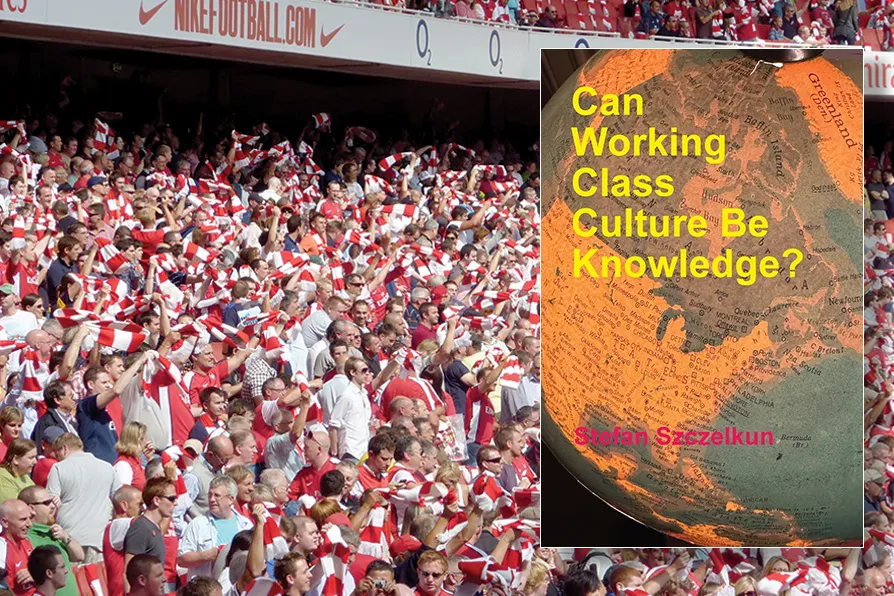ALISTAIR FINDLAY recommends the simple cadence, common prose, free verse, and descriptive power of a new collection by Julie McNeill
JON BALDWIN recommends a provocative assertion of how working-class culture can rethink knowledge


Can Working Class Culture be Knowledge?
Stefan Szczelkun, Routine Art Company, £8.95
THROUGH a discussion of aspects of working-class culture, this book challenges a basic tenet of classism: that working-class people lack intellect.
In terms of epistemology — the nature and scope, and “what counts” as knowledge — working-class culture is deemed to offer little. Certainly, in comparison to high culture. To this classism we should add the intersections of sexism, racism, ableism and so forth. But the problem is underscored: “Working class people internalise the myth of their own lack of intellect.”
The book is motivated by a modification of Tony Benn’s famous five questions on power put in cultural politics terms: What cultural power and cultural capital have you got? What class privileges afforded this? In whose interests, institutions, tastes and theories do you exercise it? Who are your paymasters? And how can we get rid of you and replace you with our voice?
What is working class culture? It could be folk culture, associated with rural traditions, as well as popular culture, more urban and commercial. What working-class culture has in common, Szczelkun demonstrates, is that it is attacked, devalued, and demonised by intellectuals from the left and right often in contrast with the notion of high art and high culture.
When working-class culture is finally recognised and celebrated it is often also deformed and neutered. Take the 1930s folk revival which saw the emergence of groups such as The Morris Ring and The Folklore Society. The folk revival was mannered, with material “devulgarised”, and cultural management and monetisation was performed by the upper and middle classes. In such a way working-class culture, along with its special vitality, rowdiness, participation and democratic spirit was frozen, cleansed, owned and ruled over.
This process happens time and again. The celebration of high culture over popular culture is often class-snobbery and a manifestation of the attempt to maintain class privilege and material power. It is a proxy for class-war proper.
Szczelkun highlights the working-class process of generating knowledge, a form of working-class epistemology. At best this is collegial, democratic, situated, contemporary, “from below” and innovative. Of course, this is not to romanticise and claim that all in this process is progressive, as there could be people left out and certain avenues left unexplored. The example of a new football chant is provided: “The spontaneous and intuitive consensual process by which a new football chant is created is certainly awe inspiring. Middle class heritage assumes creativity can only be driven by individual activity, [and] it is different for the intellectual tradition to envisage the crowd or group, thinking creatively.”
The new football chant, or political slogan, or work-song, or popular music, or open artist collective involves a process of experimentation, innovation, consensual agreement; it flourishes in informal meetings and culminates in gatherings at a football match, political rally, workplace, rave or happening. “The birth of a new football chant comes from a great number of individuals in close proximity with an emotionally charged agenda who take up a potent idea.”
This form of collective will is autonomous and does not require guidance, management, authorisation or leadership from “on high.” Crucially, at best, working-class tradition and culture “is both interpenetrating and typically unseen because its aesthetic value lies exactly in those evanescent and discursively elusive processes which are not always reflected or contained with their material outcomes.”
In such ways working-class culture can rethink knowledge.
The book reads like a series of dispatches from the culture wars and class war, including theoretical reflections, cultural history, class polemics, autobiography and interviews. It is therefore recommended.

STEVE ANDREW is intrigued by a timely and well-researched book that demonstrates the conflicted history of the central Asian country

JOSEPHINE BARBARO welcomes a diverse anthology of experiences by autistic women that amounts to a resounding chorus, demanding to be heard












